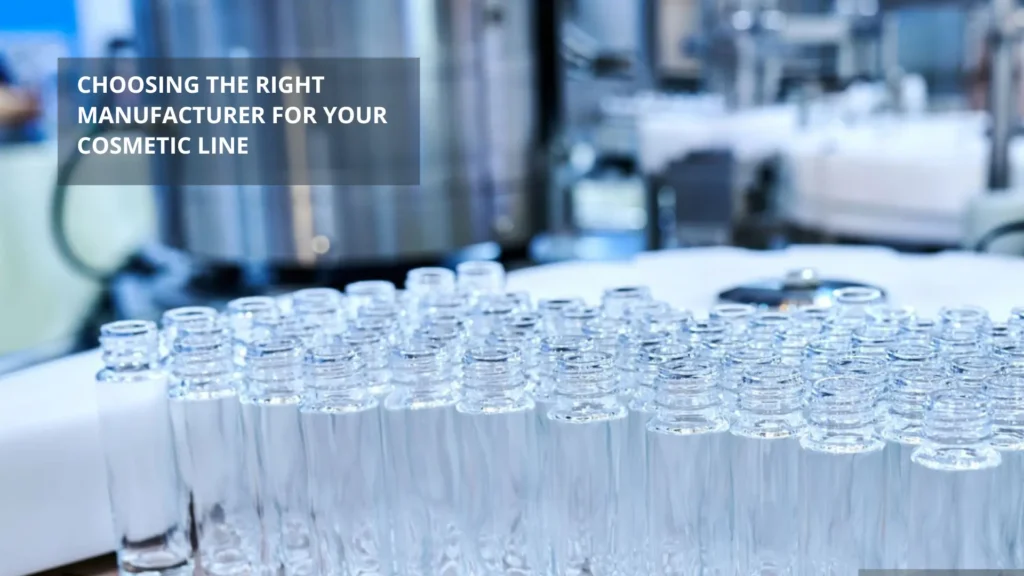📅 By Biocylab Blog | May 2025
🕒 Reading Time: 6-8 min

Selecting the right manufacturer is one of the most crucial decisions you’ll make when starting your cosmetic brand. The quality of your products, the reliability of your supply chain, and your brand’s reputation are all heavily influenced by the manufacturer you choose. In this guide, we’ll walk you through the steps to help you make an informed decision, ensuring your products meet consumer expectations and your business thrives.
Introduction
When it comes to building a successful beauty brand, manufacturing is the backbone of your business. Choosing the right manufacturer doesn’t just affect the quality of your products—it directly impacts your reputation, production timelines, and even the sustainability of your operations. Whether you’re developing a line of skincare products or launching a new makeup collection, selecting a manufacturer that aligns with your brand values and quality standards is essential.
The manufacturing partner you choose will play a critical role in ensuring that your products are consistently high-quality, compliant with regulations, and produced on time to meet market demands.
Step 1: Understanding Different Types of Manufacturers
Before diving into the selection process, it’s important to understand the various types of manufacturers available to you. Each type has its own benefits and challenges, and your choice will depend on your product goals, brand vision, and business model.
Private Label Manufacturing:
Private label manufacturers produce products under their own formulations but allow you to put your branding on them. This is a common choice for businesses looking to enter the market quickly without the complexity of product development.
Benefits:
- Faster to market
- Less costly in terms of R&D
- Established formulations
Challenges:
- Limited control over ingredients or product innovation
- Lack of exclusivity
Contract Manufacturing:
Contract manufacturers produce products based on your specifications and formulas. This allows for more flexibility than private label options while still outsourcing the production process.
Benefits:
- More control over product formulas
- Ability to scale production easily
Challenges:
- Requires more time for setup
- Higher initial costs
Custom Formulation:
Custom formulation involves working with a manufacturer to create a completely unique product tailored to your specifications. This option is ideal if you want to create innovative products that stand out in the market.
Benefits:
- Complete control over product formulations
- Differentiation in the market
Challenges:
- Longer product development timeline
- Higher minimum order quantities
Step 2: Key Factors to Consider When Choosing a Manufacturer
When evaluating potential manufacturers, you need to consider several key factors to ensure you’re choosing a partner that aligns with your needs and standards.
Certifications (GMP, ISO):
It’s essential that the manufacturer adheres to good manufacturing practices (GMP) and holds relevant certifications (like ISO). These certifications indicate that the manufacturer follows rigorous quality control standards, ensuring the safety, effectiveness, and quality of your products.
Production Capacity and Lead Times:
Ensure the manufacturer has the production capacity to meet your demand, especially as your business grows. Look at their lead times for production and delivery, as delays can affect your ability to launch and maintain sales momentum.
Step 3: The Importance of Clear Communication and Transparency
Clear communication is essential when working with any manufacturer. It’s important to establish strong relationships and ensure there’s transparency throughout the production process.
Building Strong Relationships:
Treat your manufacturer as a long-term partner. Open and honest communication helps prevent misunderstandings and ensures that both parties are aligned on goals and expectations. Regular communication will also help you troubleshoot potential issues before they become significant problems.
Ensuring Transparency:
Transparency should be a priority in all dealings. Your manufacturer should be willing to provide updates on production progress, share timelines, and be forthcoming about any challenges or issues that arise during the production process.
Step 4: Evaluating Manufacturer Capabilities and Track Record
Choosing the right manufacturer is not just about their ability to produce your products—it’s about their proven capability to deliver high-quality products on time.
Key Questions to Ask During the Evaluation Process:
- What is your experience in producing beauty products similar to mine?
- Do you have a proven track record of delivering products on time?
- How do you ensure quality control throughout the production process?
- Can you handle custom formulations, and if so, how flexible are you with ingredient sourcing?
Checking Manufacturer References and Portfolios:
Ask for references and review their portfolio of past work. A reputable manufacturer should be able to provide you with testimonials from other clients and showcase products they’ve produced. This helps you assess their level of expertise and the quality of their previous work.
Step 5: Negotiating Terms and Setting Expectations
Once you’ve found a potential manufacturer, the next step is to negotiate terms and set clear expectations. Both parties need to agree on important factors such as pricing, timelines, and quality standards.
How to Negotiate Production Costs, Timelines, and Quality Standards:
- Cost: Negotiate the pricing structure, ensuring you’re getting competitive rates for the level of quality and service provided.
- Timelines: Set clear deadlines for production and delivery. Ensure that the manufacturer is realistic about lead times.
- Quality Standards: Clearly define quality control measures, product specifications, and acceptable standards for the finished products.
Ensuring Both Parties Are Aligned on Expectations:
Make sure both you and the manufacturer have a clear understanding of your expectations. This includes agreeing on packaging requirements, testing protocols, and any other specific needs your beauty brand may have.
Conclusion
Choosing the right manufacturer is a key decision that can significantly influence the success of your beauty brand. A reliable and capable manufacturer will not only produce high-quality products but will also serve as a trusted partner in helping your brand grow. By carefully considering the type of manufacturer, assessing their capabilities, ensuring clear communication, and negotiating terms that align with your business needs, you can build a successful partnership that supports your brand’s long-term success.

